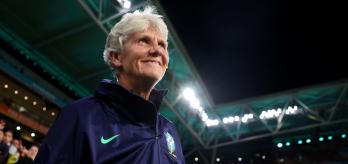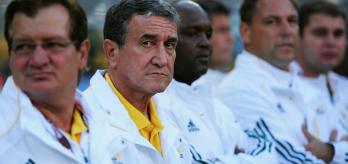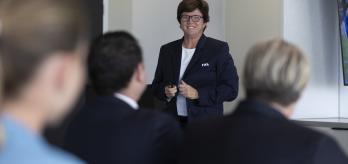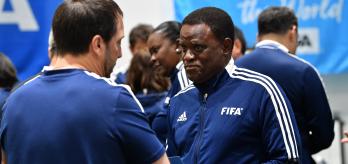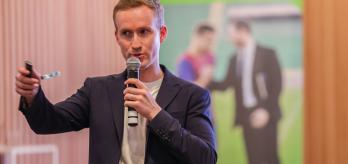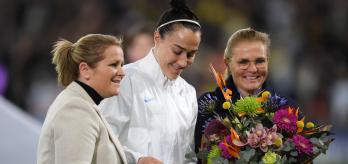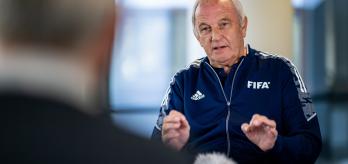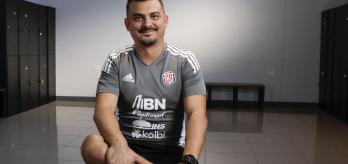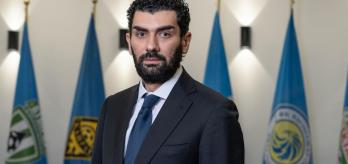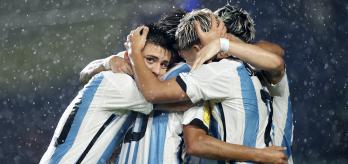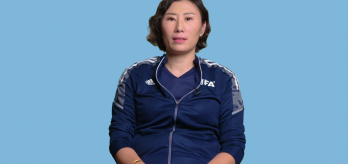Learning
- The benefits of sharing knowledge and expertise in order to solve common problems
- Solutions to common problems can be found in the experience of colleagues
- The importance of collaboration within the planning stage of a project
Broadening the sphere of collaboration
Member associations should adopt the concept of ‘football family’ and come together off the pitch to share knowledge and expertise in order to solve common problems, says Luis Castro, Argentina FA Development Director.
“In my professional roles, I am very close with many other countries,” explains Castro, who works as a FIFA Technical Leadership expert. “Through experience, knowledge, contacts and networking with other countries around the world – specifically in South, Central and North America - I saw so many challenges that are common between us.”
Castro, who has worked for the Argentinian Football Association for over 20 years, believes member associations must do more to come together off the pitch in order to share ideas, knowledge and expertise for the greater good of the game.
“Of course, during games every nation is there to win,” explains Castro. “But outside of the field of play, each nation should adopt the concept of ‘football family’. In the same way you work together as a family, we should do the same in football. As a father, I can help my daughters. But my daughters can also help me through sharing new experiences. New generations bring new knowledge and new expertise.
“I think that the new paradigm of a ‘football family’ should be to share knowledge, expertise, infrastructure and experiences.”
Castro believes that a more open and sharing “football family” could help with the efficiency and effectiveness of projects and solving common problems.
“Whatever challenge you are facing you can learn from the experiences from others who have already faced those challenges,” he says. “For tough challenges I always try to be proactive and find creative solutions. Those solutions can be found through the experience of our colleagues and by sharing and being open.”
Before becoming Development Director, Castro was Head of Argentina’s National Team Department and Development Manager for nearly 17 years. Through his many experiences for the association, and also for FIFA, Castro has learned that collaboration is critical to success.
“When I started the VAR project in Argentina, it was from scratch. The only models or advice I received were from Europe. There were no colleagues from South America or even North America who could help me. Instead, I was talking with guys from Germany, Spain and the Netherlands.
“They have all been really open with me. They have invited me to their federations and let me see what is going and they share some of their practises in order to help me. Of course, they are different realities, but common problems.”
Seek out collaboration before a project starts
To have maximum success, collaborating and seeking out experiences from others should be done before a project starts, believes Castro. “In the planning stage of a project you need to go through a deep reflection,” he explains. “Usually, the deeper you reflect the better the outcomes of the project will be.
“But, of course, it takes quite a long time to reflect deeply on every aspect of a project that you face. Instead, the reflection will be much quicker if you can talk and discuss with other colleagues who have already faced those kind of projects and reflections before. The more deeply you reflect and the more open you can be at the beginning makes it a ‘win win’ situation for everyone. Reflecting on the project before it begins is critical for the outcome that you will receive from your project.”
IT infrastructure: having the ‘right tools’ in order to grow
To effectively connect the “football family”, member associations must have the appropriate technology in place to facilitate communication, says Castro.
“When I started as Director of Development 6 years ago, our association needed a lot of development, but not only in the game perspective. My aim was that I want to be a transversal platform for the development efforts in every area of my association. My very first project as development director of Argentina was for IT infrastructure renewal. It was so important, because how can you grow if you don't have the proper tools?
“The project has a tremendous impact for my association,” adds Castro. “I don't know how we could have faced the pandemic without the new technology in place. We had implemented new servers, 180 new computers, 50 notebooks, new connectivity, infrastructure, website and performance tools. So, the project allowed us to achieve the aim of sharing with the football family.”
Continuing to learn from every experience and interaction
In Castro’s roles with the Argentinian FA and also with FIFA he has worked at over 20 major international competitions. He has tried to treat every experience and interaction as a learning experience along the way.
“I’ve been through so many tournaments and so many countries and I have met so many people around the world who give me so much knowledge and expertise. Many people have shared knowledge and have been really generous with me.
“Every coach, physical trainer, doctor and player that I have had the chance to meet, to share dressing rooms, flights, hotels and competitions with – sometimes for longer than 35 days in a row – I’ve been blessed to learn from every one of them.
“I started in this business at 23 years old and now I am 47. And I believe that I am still learning, I’m still feeling that I have a lot of work to do, to learn from every colleague and from every person I share with.”
Castro believes that sharing of knowledge should be reciprocal and if you give you will always get more back. “During the three days on the Technical Leadership course everyone was sharing experience, knowledge and expertise. I shared three different projects with my colleagues and I received some really interesting projects in return: from beach soccer to VAR.”
Summary
-
Share knowledge and expertise with other member associations in order to solve common problems
-
Collaborate and seek out experiences from others before a project starts
-
Sharing knowledge should be reciprocal. The more you give, the more you should get back
Reflection
-
How often do you contact other technical directors or member associations to discuss common problems?
-
Do you build collaboration into the planning stage of the project cycle? If not, when do you include it?
-
What is your experience of sharing knowledge with others? What has the return of information been like? How do you think this could be improved?











